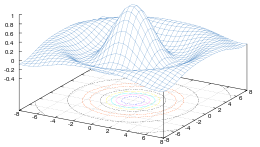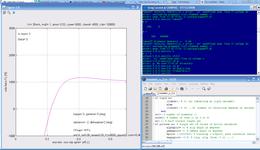GNU Octave
 |
|
|---|---|
 GNU Octave |
|
| Developer(s) | John W. Eaton |
| Initial release | 1988 |
| Written in | C++ |
| Platform | Cross-platform |
| Available in | 19 languages |
| Type | Scientific computing |
| License | GNU General Public License |
| Website | http://www.gnu.org/software/octave/ |
GNU Octave is a high-level language, primarily intended for numerical computations. It provides a convenient command line interface for solving linear and nonlinear problems numerically, and for performing other numerical experiments using a language that is mostly compatible with MATLAB. It may also be used as a batch-oriented language.
As part of the GNU Project, it is free software under the terms of the GNU General Public License.
Contents |
History
The project was conceived around 1988. At first it was intended to be a companion to a chemical reactor design course. Real development was started by John W. Eaton in 1992. The first alpha release dates back to January 4, 1993 and on February 17, 1994 version 1.0 was released. Version 3.0 was released on December 21, 2007.
The program is named after Octave Levenspiel, a former professor of the principal author who was known for his ability to perform quick back-of-the-envelope calculations.[1]
Deployments
In addition to use on desktops for personal scientific computing, Octave is used in academia and industry. For example, Octave was used on a massive parallel computer at Pittsburgh supercomputing center to find vulnerability related to guessing social security numbers.[2]
Technical details
- Octave is written in C++ using STL libraries.
- Octave uses an interpreter to execute the Octave scripting language.
- Octave is extensible using dynamically loadable modules.
- Octave interpreter works in tandem with gnuplot and Grace software to create plots, graphs, and charts, and to save or print them.
Octave, the language
The Octave language is an interpreted programming language. It is a structured programming language (similar to C) and supports many common C standard library functions, and also certain UNIX system calls and functions.[3] However, it does not support passing arguments by reference.[4]
Octave programs consist of a list of function calls or a script. The syntax is matrix-based and provides various functions for matrix operations. It is not object-oriented, but it does support various data structures.
Its syntax is very similar to MATLAB, and careful programming of a script will allow it to run on both Octave and MATLAB.[5]
Because Octave is made available under the GNU General Public License, it may be freely changed, copied and used.[1] The program runs under most Unix and Unix-like operating systems, as well as Microsoft Windows.[6]
Notable features
Command and variable name completion
Typing a TAB character on the command line causes Octave to attempt to complete variable, function, and file names (similar to Bash's tab completion). Octave uses the text before the cursor as the initial portion of the name to complete.
Command history
When running interactively, Octave saves the commands typed in an internal buffer so that they can be recalled and edited.
Data structures
Octave includes a limited amount of support for organizing data in structures. For instance:
octave:1> x.a = 1; x.b = [1, 2; 3, 4]; x.c = "string";
octave:2> x.a
ans = 1
octave:3> x.b
ans =
1 2
3 4
octave:4> x.c
ans = string
octave:5> x
x =
{
a = 1
b =
1 2
3 4
c = string
}
Short-circuit boolean operators
Octave's `&&' and `||' logical operators are evaluated in a short-circuit fashion (like the corresponding operators in the C language), in contrast to the element-by-element operators `&' and `|'.
Increment and decrement operators
Octave includes the C-like increment and decrement operators `++' and `--' in both their prefix and postfix forms.
Unwind-protect
Octave supports a limited form of exception handling modeled after the unwind-protect form of Lisp. The general form of an unwind_protect block looks like this:
unwind_protect body unwind_protect_cleanup cleanup end_unwind_protect
Variable-length argument lists
Octave has a real mechanism for handling functions that take an unspecified number of arguments without explicit upper limit. To specify a list of zero or more arguments, use the special argument varargin as the last (or only) argument in the list.
function s = plus (varargin) if (nargin==0) s = 0; else s = varargin{1} + plus (varargin{2:nargin}); endif endfunction
Variable-length return lists
A function can be set up to return any number of values by using the special return value varargout. For example:
function varargout = multiassign (data) for k=1:nargout varargout{k} = data(:,k); endfor endfunction
C++ Integration
It is also possible to execute Octave code directly in a C++ program. For example, here is a code snippet for calling rand([9000,1]):
#include <octave/oct.h> ... ColumnVector NumRands(2); NumRands(0) = 9000; NumRands(1) = 1; octave_value_list f_arg, f_ret; f_arg(0) = octave_value(NumRands); f_ret = feval("rand",f_arg,1); Matrix unis(f_ret(0).matrix_value());
MATLAB compatibility
Octave has been built with MATLAB compatibility in mind, and shares many features with MATLAB:
- Matrices as fundamental data type.
- Built-in support for complex numbers.
- Powerful built-in math functions and extensive function libraries.
- Extensibility in the form of user-defined functions.
There are a few purposeful, albeit minor, differences:
- Comment lines can be prefixed with the # character as well as the % character
- Various C-based operators ++, --, +=, *=, /= are supported
- Elements can be referenced without creating a new variable, e.g. [1:10](3)
- Strings can be defined with the " character as well as the ' character
See also
- List of numerical analysis software
- Comparison of numerical analysis software
- List of statistical packages
- List of numerical libraries
External links
- Octave.org Home Page
Documentation
- Online documentation
- Octave wiki (click twice – page redirects cause some browsers to time out)
- Octave FAQ Wiki with new plotting commands
- Mailing List Archives on Nabble – Search all Octave mailing lists.
- Mailing List Archives on Gmane – Search all Octave mailing lists.
- Octave Community
Graphical user interfaces
- Kalculus - Matlab like UI for GNU Octave and Yacas written in Qt4 with Ruby bindings
- Xoctave – Xoctave encapsulates GNU Octave using pipes and provides extra tools to make using it easier. Its UI is very similar to that of Matlab.
- OctaveNB – NetBeans IDE integration for GNU Octave (since 2009) - features SVN, local history, diff, multi language projects from the NetBeans IDE for your Octave development
- QtOctave Graphical User Interface – MATLAB counterpart – under heavy development
Web Interfaces
- Online access to Octave – Allows you to perform simple Octave calculations online.
- Monkey Analytics – Web based math computation tool, runs Octave from your browser
- MathCloud – Share Matlab/Octave scripts and data and do your computations in the cloud
Add-ons
- PLPlot - a replacement of the traditional gnuplot in Octave
- Octave-forge community development page – Toolboxes for various problems from independent developers.
- OctPlot – High quality 2D graphics.
- Octave graphics add-on – 3D visualization system for Octave.
- Octaviz – 3D visualization system for Octave.
- MPI Toolbox for Octave (MPITB) – Parallel Computing for Octave using MPI.
References
- ↑ 1.0 1.1 Eaton, John W. "About Octave". http://www.gnu.org/software/octave/about.html. Retrieved 2009-06-28.
- ↑ HPC, July 8, 2009.
- ↑ "GNU Octave - Controlling subprocesses". November 14, 2008. http://www.network-theory.co.uk/docs/octave3/octave_269.html. Retrieved Jan 28, 2009.
- ↑ "GNU Octave". http://www.delorie.com/gnu/docs/octave/octave_105.html. Retrieved Jan 28, 2009.
- ↑ "FAQ: MATLAB compatibility". http://www.gnu.org/software/octave/FAQ.html#MATLAB-compatibility. Retrieved July 4, 2009.
- ↑ "FAQ: Getting Octave". http://www.gnu.org/software/octave/FAQ.html#Getting-Octave. Retrieved July 4, 2009.
|
|||||||||||||||||||
|
|||||||||||
